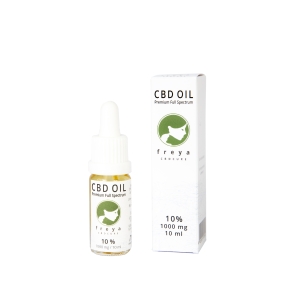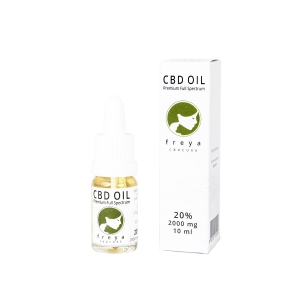Reading Time: 5 minutes
The 2024 Olympic Games in Paris are approaching, and a hot topic is the use of cannabis in competitive sports. Since the case of US sprinter Sha'Carri Richardson, who was excluded from the 2021 Tokyo Olympics due to cannabis use, the discussion around cannabis and sports has intensified. Here's everything you need to know about cannabis at the 2024 Olympic Games.
Table of Contents
- Ban and Regulations
- Sha'Carri Richardson and Implications
- Competitive Sports and Cannabis
- Doping Controls and Detection Methods
- Support and Criticism
- CBD Products for Recovery
- Conclusion
Ban and Regulations
The International Olympic Committee (IOC) has banned the use of cannabis products such as marijuana and hashish for the Olympic Games. Cannabinoids are listed as "restricted prohibited substances" on the IOC's doping list. A threshold of 15 ng/ml for the main metabolite carboxy-THC in urine has been set to avoid positive results from passive smoking.
This threshold was established after extensive studies to protect athletes and ensure substances are not abused. However, the use of CBD products is allowed as long as they do not contain high concentrations of THC. It is crucial for athletes to be aware of the regulations to avoid any unpleasant surprises.
Sha'Carri Richardson and Implications
A prominent case is that of US sprinter Sha'Carri Richardson. Richardson was excluded from the 2021 Tokyo Olympics after a positive THC test. She had consumed marijuana during the US trials in Oregon to cope with her mother's death. Her suspension sparked significant discussion and solidarity among US athletes and beyond.
This case has further fueled the debate about the use of cannabis in sports and led to discussions about the need for rule changes. Many athletes and experts argue that cannabis is not a performance-enhancing drug and can instead help manage stress and anxiety.
Competitive Sports and Cannabis
Cannabis has varying effects in competitive sports. Some sports, particularly high-risk ones like downhill cycling and ski racing, have explicitly banned cannabis to ensure athlete safety. Studies show that THC has psychotropic effects that can be both relaxing and euphoric, which could be advantageous in nerve-wracking competition situations.
Interestingly, some athletes use cannabis to recover from intense training and competitions. It is reported that THC-containing products can help relieve muscle tension and pain. Simultaneously, the calming effect of THC can help relax the mind and improve focus.
Doping Controls and Detection Methods
Doping controls at the Olympic Games are conducted using gas chromatography/mass spectrometry (GC/MS). This method detects the THC metabolite carboxy-THC in urine. Controls are conducted both in training and competition. It has been shown that a higher percentage of positive results occur in training controls than in competition controls.
The precise analysis and detection methods ensure that all athletes compete fairly and without prohibited substances. At the same time, the tests are designed to distinguish between occasional and regular use to allow for fair evaluations.
Support and Criticism
Following the Sha'Carri Richardson incident, many prominent figures, including Patrick Mahomes and Dwyane Wade, expressed their support. Even US President Joe Biden showed understanding. Richardson was even invited by rap mogul Kanye West to appear in a music video, further boosting her popularity.
Public opinion on the issue of cannabis in sports is divided. While some believe the rules are outdated and overly strict, others think strict controls are necessary to maintain the integrity of the sport.
CBD Products for Recovery
CBD products are legal at the Olympic Games as long as the THC threshold is not exceeded. Since the last Games, CBD is no longer subject to doping regulations. Athletes frequently use CBD products to support recovery phases between competitions.
Our crew has had positive experiences using CBD products. They help shorten recovery periods by reducing inflammation and improving sleep quality. Here are some of our favorite products:

CBD Oil 10% - freya CBDCURE
CBD Oil 10% from freya CBDCURE helps athletes recover faster by supporting the endocannabinoid system. It helps reduce inflammation and promotes better sleep, which is crucial for recovery. View Product: CBD Oil 10%

CBD Oil 20% - freya CBDCURE
CBD Oil 20% from freya CBDCURE offers a stronger concentration for more intensive recovery needs. It is excellent for supporting the endocannabinoid system during intense training and competition phases. View Product: CBD Oil 20%

CBD Oil 40% - freya CBDCURE
For athletes needing maximum support, CBD Oil 40% from freya CBDCURE offers a highly concentrated solution. It promotes recovery, relieves pain, and supports the overall health of the endocannabinoid system. View Product: CBD Oil 40%
Conclusion:
The discussion about cannabis at the Olympic Games remains complex. While the IOC and many international sports federations continue to list cannabis on their doping lists, public support for athletes who use cannabis to cope with personal challenges is growing. The 2024 Olympic Games in Paris could mark a turning point, where rules are further adapted to reflect current societal and medical understanding. However, it remains crucial for athletes to respect the existing rules and be aware of the potential consequences to not jeopardize their sporting dreams.

